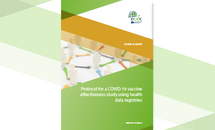Protocol for a COVID-19 vaccine effectiveness study using health data registries
This protocol presents a common methodology to estimate vaccine effectiveness (VE) for COVID-19, using established health data registries in participating EU/EEA Member States.
Executive summary
This protocol presents a common methodology to estimate vaccine effectiveness (VE) for COVID-19, using established health data registries in participating EU/EEA Member States. This work is performed within the Vaccine Effectiveness, Burden and Impact Studies (VEBIS) framework contract. A pilot study with the participation of Denmark, Spain (Navarre) , Norway and Portugal was carried out between April and June 2022, following a common pilot protocol (published by ECDC in 2022) [1, 2]. The experience gained in the pilot informed the current protocol.
The study design is a retrospective cohort study using data collected routinely in electronic health records databases, with data on the resident community-dwelling population (i.e., excluding those living in nursing homes) who belong to an age group for whom vaccination has been universally recommended at the time of the study. Outcomes of interest include hospital admission or death due to COVID-19. Other data to be collected include socio-demographic (age, sex), clinical (comorbidities, previous history of SARS-CoV-2 infection) and COVID-19 vaccination (brand, number and dates of dose administration) variables. The protocol outlines the agreed methods for analysing available data related to COVID-19 outcomes at country level and includes a plan for the pooled analysis. The proposed approach of the study is to produce prospectively monthly VE estimates to monitor VE over time. Vaccine effectiveness will be estimated in study periods covering an eight-week follow-up time. A minimum of one month between the end of the study period and the data extraction date will be omitted, to allow consolidation of data, particularly regarding hospital discharge data in which estimates for some study sites are based. Therefore, this protocol defines a rolling-study period in which the eight-week window is moved forward one month for each successive monthly estimate.
This master protocol is primarily intended to guide the implementation of ECDC-funded studies. However, ECDC encourages the conduct of vaccine effectiveness studies, using this protocol as a basis, in countries that do not currently plan to participate in ECDC-funded studies. The use of consistent protocols will facilitate the comparability of results across studies, countries and sites.
Download







